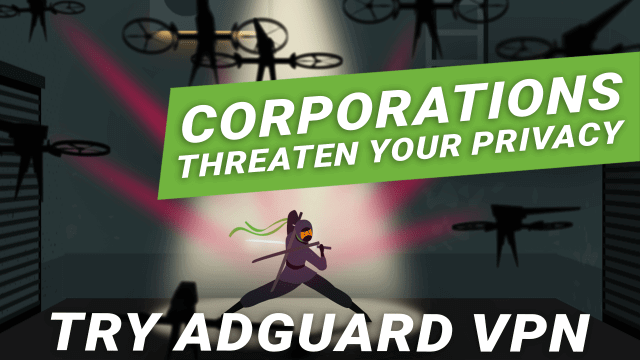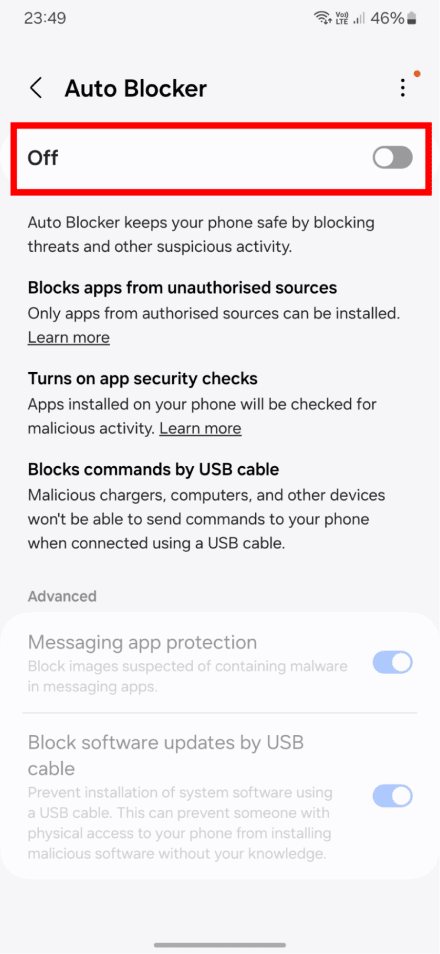VPN எப்படி செயல்படுகிறது?
VPN குறியாக்கத்தைப் பெற்று பாதுகாப்பான VPN சுரங்கங்களை உருவாக்குகிறது
VPN தொழில்நுட்பம் தரவு குறியாக்கக் கையாள்வதைப் பயன்படுத்தி உங்கள் சாதனம் (புள்ளி A) இலக்குச் சேவையகம் (புள்ளி B) வரை பாதுகாப்பான சுரங்கங்களை உருவாக்குகிறது. எடுத்துக்காட்டு: உங்கள் சாதனத்தில் AdGuard VPN செயல்படுத்தப்பட்டுள்ளபோது, YouTube ஐ அணுக விரும்பினால்:
உங்கள் சாதனம் மற்றும் VPN வழங்குநரின் (முதலாவதாக AdGuard VPN போன்ற) VPN சேவையகம் இடையே குறியாக்க இணைப்பு உருவாக்கப்படுகிறது
உங்கள் இணையப் போக்குவரத்து குறியாக்கம் செய்யப்பட்டு உருவாக்கப்பட்ட VPN சுரங்கம் மூலம் VPN சேவையகத்திற்கு முனைப்பாக அனுப்பப்படுகிறது
VPN சேவையகம் உங்கள் தகவல்களில் ஒரு பகுதியை போக்குவரத்து மற்றும் VPN அடுக்குகளில் பகுதி குறியாக்கம் மிகக் குறைவாகவே திறக்கிறது. உங்கள் தரவு (பயனர் நற்சான்றிதழ்கள், cookies, பணம் விபரங்கள் அல்லது பார்க்கப்பட்ட வீடியோக்கள்) குறியாக்க நெறிமுறைக் அடுக்கில் TLS குறியாக்கத்துடன் ரகசியமாகவே இருக்கும், VPN வழங்குநருக்கு தெரியாது
*VPN சேவையகம் YouTube சேவையகத்துடன் இணைந்து உலாவியில் அல்லது YouTube பயன்பாட்டிலிருந்து வந்த கோரிக்கையை அனுப்புகிறது
YouTube சேவையகம் VPN சேவையகத்திற்கு தரவு அனுப்புகிறது
VPN சேவையகம் TLS குறியாக்கப்பட்ட போக்குவரத்திற்கு VPN குறியாக்க அடுக்கைச் சேர்ந்ததாக சேர்த்து உங்களுடைய சாதனத்திற்கு அனுப்புகிறது
உங்கள் சாதனம் குறியாக்கப்பட்ட போக்குவரத்தைப் பெறும், அதை குறியாக்கத்தைத் திறந்து, கோரிக்கையைத் துவங்கிய உலாவி அல்லது YouTube பயன்பாட்டிற்கு அனுப்புகிறது
சுருக்கமாகச் சொன்னால், VPN தொழில்நுட்பம் உங்கள் ஆன்லைன் அடையாளத்தை மறைத்து முழுமையாக வேறு IP முகவரி, இருப்பிடம் மற்றும் தொடர்புடைய தரவு கொண்டு ஒரு தொலைவிலுள்ள VPN சேவையக வழியாக உங்கள் போக்குவரத்தை செலுத்த உங்களை அனுமதிக்கிறது. இது உங்கள் போக்குவரத்திற்கு கூடுதல் பாதுகாப்பு அடுக்கு சேர்க்கும், அதைப் பாதுகாப்பாக குறியாக்கம் செய்வதன் மூலம்.
விளம்பரதாரர்கள், ஹேக்கர்கள் மற்றும் பிற மூன்றாம் தரப்பு குழுக்கள் உங்கள் சாதனத்திற்கும் VPN சேவையகத்திற்கும் இடையில் போக்குவரத்தை கண்காணிக்க முயற்சிக்கலாம். VPN உங்கள் போக்குவரத்து குறியாக்கத்தில் இருப்பதை உறுதி செய்யும், அவ்வாறு பார்த்தவர்கள் குறியாக்கமான தரவு ஓட்டத்தில் எந்த பயனுள்ள தகவலையும் எடுக்க முடியாது. குறிப்பு: உங்கள் ஐபி முகவரி மறைக்கப்பட்டிருந்தாலும், cookies மற்றும் சாதன விஷ்ணு அடையாளம் மூலம் உங்கள் ஆன்லைன் செயல்பாடுகள் தொடர்ந்து கண்காணிக்கப்படலாம்.

VPN நெறிமுறைகள் மற்றும் அவை வகைகள்
VPN நெறிமுறை என்பது அனுமதிக்கப்பட்ட உட்புகுந்தல் மற்றும் டிரான்ஸ்போர்ட் நெறிமுறைகள் மற்றும் குறியாக்க முறைகளுக்கான ஒரு கட்டளைகளின் தொகுப்பாகும். இது உங்களுக்கும் VPN சேவையகத்திற்கும் இடையே இணைப்பு எவ்வாறு நிறுவப்படுகிறது என்பதை நிர்ணயிக்கிறது. VPN நெறிமுறைகள் வேகத்தில், பாதுகாப்பில், ஆதரவு தரப்படும் நெட்வொர்க்குகள் மற்றும் தளங்களில் வேறுபடுகின்றன.
பிரபலமான VPN நெறிமுறைகளை ஆய்வு செய்து அவற்றின் பலவீனங்களையும் பலத்துகளையும் விவரித்து பார்ப்போம்.
IPsec
இணைய நெறிமுறை பாதுகாப்பு (IPsec) என்பது இரு முகவர்கள் (host-to-host, பாதுகாப்பு கேட்வே (network-to-network), அல்லது ஒரு ஹோஸ்டும் கேட்வேயும்) இடையே அடையாளத்துடனும், குறியாக்கத்துடனும், பரஸ்பர உறுதியுடனும் செயல்படும் ஒரு பாதுகாப்பான நெட்வொர்க் நெறிமுறையாகும். இந்த நெறிமுறை இணைய போக்குவரத்துக்குப் பாதுகாப்பை பின்வரும் அம்சங்கள் வழியாக வழங்குகிறது:
ரகசியத்தன்மை: குறியாக்கம் செய்யப்படாத தரவை அனுப்புபவர் மற்றும் பெறுபவர் மட்டுமே அணுக முடியும்
நிர்வகிப்பு: தரவு தொகுப்புகள் மாற்றப்பட்டால் மாறும் அதற்கான ஹாஷ் மதிப்புகள் கொண்டிருக்கும். தரவு நம்பகமானதா என்பதைக் குறித்து ஒவ்வொரு தரவு தொகுப்புக்கு இரு பக்கமும் ஹாஷ் மதிப்பை கணக்கிடுகின்றன
ஆண்டி-ரிப்பிளை: IPsec ஒப்புருதான தொகுப்புகளை அனுப்பத் தவிர்க்க வரிசைத் தரவைப் பயன்படுத்துகிறது. ஹேக்கர்கள் தொகுப்பைப் பிடித்தாலும், அதை மீண்டும் அனுப்ப முடியாது
அடையாளம் உறுதி: அனுப்புபவரும் பெறுபவரும் இருவரும் உறுதிப்படுத்தப்படுவதால், தரவு நோக்கிடப்பட்ட நபரிடம் சென்றுவிடும் என்பதை உறுதிசெய்ய முடியும்
OpenVPN (TCP மற்றும் UDP)
மிகவும் பிரபலமான இலவச நெறிமுறைகளில் ஒன்று OpenVPN ஆகும். இயல்பாக, இது UDP ட்ரான்ஸ்போர்டை பயன்படுத்துகிறது: அனைத்து நெட்வொர்க் பகட்பேக்கட்டுகளும் UDP டேட்டாகிராம்களாக முற்றுத்துணிக்கப்படுகின்றன, பிறகு VPN சேவையகத்திற்குச் அனுப்பப்படும். இருப்பினும், பொதுவான நெட்வொர்க்களில் UDP போக்குவரத்து அடிக்கடி தடைக்கப்படுகின்றது. இதற்கான ஒரு மாற்றுவழியாக, TCP முற்றுத்துணிக்கைப் பயன்படுத்தலாம், ஆனால் இது சேவையகத்தில் கூடுதல் உள்ளமைப்பைத் தேவைப்படுத்தும். பல பயனர்கள், இதன் அமைப்புகளின் நெகிழ்வுத்தன்மை மற்றும் பல்வேறு தளங்களுடன் இருக்கும் இணக்கத்தை பாராட்டுகிறார்கள். இருப்பினும், இந்த நெறிமுறையை பயன்படுத்துவதற்கு சில தொழில்நுட்ப அறிவு தேவைப்படுகிறது.
PPTP
Point-to-Point Tunneling Protocol (PPTP) என்பது இத்தகைய முதல் கருவிகளில் ஒன்றாகும், இது Windows 95 க்காக வெளியிடப்பட்டது. இது தற்போது காலம் சென்றதாகும் மற்றும் பெரிதும் பயன்படுத்தப்படவில்லை, ஏனெனில் இதில் சில நெறிமுறை பாதிப்புகள் உள்ளன மற்றும் எளிதாக ஹேக் செய்யப்படுகிறது.
L2TP
Layer Two Tunneling Protocol (L2TP), PPTP-ன் ஒரு விரிவாக்கம், VPN களை ஆதரிக்கவோ அல்லது ISP சேவையளிப்பு ஒரு பகுதியாகவோ பயன்படுத்தப்படுகிறது. இந்த நெறிமுறை அதன் கட்டுப்பாட்டுசெய்திகளை மட்டும் குறியாக்கம் செய்யும், உள்ளடக்கத்தைக் குறியாக்கம் செய்யாது. இது தரவு இணைப்பு அடுக்கு (OSI நெட்வொர்க் தொடர்பு மாதிரியில் அடுக்கு 2) பகுதியில் ஒரு சுரங்கத்தை உருவாக்குகிறது, இது IPsec போன்ற நெட்வொர்க் அடுக்கு குறியாக்க நெறிமுறையின் மூலம் அனுப்பப்படலாம்.
WireGuard
Jason A. Donenfeld உருவாக்கிய நெறிமுறையின் இலகுரக நிரல்மூலம் சிறந்த இணைப்பு வேகத்தை வழங்குகிறது. இது பயன்படுத்த எளிதும், அதன் எளிய வடிவமைப்பும் நவீன எலிப்டிக்-கர்வ் குறியாக்கமும் காரணமாக உயர் பாதுகாப்பும் அளிக்கிறது. இருப்பினும், இது TCP-ஐ ஆதரிக்காததால், UDP போக்குவரத்தைக் தடுக்கும் நெட்வொர்க்களில் வேலை செய்யக்கூடாது. மேலும், IPsec-க்கு மாறாக, இந்த நெறிமுறையைப் பயன்படுத்த சிறப்பு செயலியை பதிவிறக்கம் செய்ய வேண்டும், ஏனெனில் சாதாரண பயனர் பயன்பாட்டு இயக்கத்தளங்கள் நட்டிவாக ஆதரிக்கவில்லை.
SSTP
Secure Socket Tunneling நெறிமுறை Microsoft ஆல் Windows அடிப்படையிலான சாதனங்களுக்கு உருவாக்கப்பட்டது. நீங்கள் Microsoft Azure ஐ பயன்படுத்தினால், TLS 1.2 ஐ ஆதரிக்கும், SSTP கொண்ட Windows 8.1 அல்லது அதற்குப் பிறகு வரும் பதிப்பு தேவை. சொந்த உரிமம் கொண்ட TLS அடிப்படையிலான நெறிமுறையாக SSTP சுவர்களை கண்மூடி கடக்க முடியும்; பெரும்பாலான சுவர்கள் வெளியே செல்லும் TCP போர்ட் 443–ஐ திறந்திருக்கும். SSTP, SSL/TLS சேனல் வழியாக PPP போக்குவரத்தை அனுப்பும் தன்மையுள்ள முறையையும், போக்குவரத்து அடுக்கில் பாதுகாப்பையும் அளிக்கிறது.
சொந்த உரிம நெறிமுறைகள்
மேலே விவரிக்கப்பட்டுள்ள நெறிமுறைகள் மற்றும் தொடர்புடைய மென்பொருட்களின் முதன்மை நோக்கம் நிறுவனங்கள் உட்பட தனியார் பிணையங்களை வழங்குவது ஆகும். இவை சுவர்களை அல்லது போர்ட் தடைகளை மீற, அல்லது கிளையன்ட் VPN பயன்படுத்துவது என்பதைக் மறைக்க வடிவமைக்கப்படவில்லை. வணிக மென்பொருளில் இவைகளின் பயன்பாடு உரிமவரி கட்டுப்பாடுகளால் மட்டுப்படுத்தப்படலாம்.
அதனால்தான் பெரிய பொது VPN சேவை வழங்குநர்கள் தங்களுக்கே உரிய VPN நெறிமுறைகளை உருவாக்குகிறார்கள். இந்த வகையில், ExpressVPN-ன் LightWay, Hotspot Shield-ன் Hydra, மற்றும் எங்களது சொந்த உரிமமை AdGuard VPN நெறிமுறை ஆகியவை அடங்கும்.
குறிப்பாக, AdGuard VPN நெறிமுறை வேகமாகவும், மின்சாரத்தை மிச்சப்படுத்தும்படியும், சாதாரண HTTPS போக்குவரத்துடன் வேறுபடாதவிதமாகவும் வடிவமைக்கப்பட்டுள்ளது.
உங்களுக்கு ஏன் VPN தேவை?
டிஜிட்டல் யுகத்தில் வாழ்வதில் உள்ள குறைபாடு என்னவென்றால், உங்கள் ஆன்லைன் செயல்பாடுகள் கண்காணிக்கப்படுகின்றன. உங்கள் வீட்டு முகவரி எப்படி அஞ்சல்களை வழங்க பயன்படுத்தப்படுகிறதோ, அதேபோல் உங்கள் IP முகவரி இணைய ட்ராஃபிக் எங்கு அனுப்பப்படுகிறது என்பதை தீர்மானிக்க, அல்லது ஒரு குறிப்பிட்ட தேடல் வினவல் அல்லது இணையதளப் பார்வையின் மூலத்தை கண்டறிய பயன்படுத்தப்படுகிறது. இதுதான் ஹேக்கர்களும் மற்ற மூன்றாம் தரப்பினரும் உங்களை கண்டுபிடிக்க முடிவது. மேலும், சில இணையதளங்கள் குறிப்பிட்ட இடங்களில் இருந்து தங்களது தரவை அணுகுவதைத் தடுக்கலாம்.
VPN எப்படி உதவலாம்? ஒரு Virtual Private Network உங்கள் உண்மையான IP முகவரியை வெளிப்படுத்துவதைத் தவிர்க்க, உங்கள் அனைத்து தரவையும் ஒரு பாதுகாப்பான இணைப்பில் ஒரு பிரத்யேக சேவையகத்திற்கு ப்ராக்ஸி செய்வதை அனுமதிக்கிறது.
VPN பயன்படுத்த வேண்டிய சில காரணங்கள்:
பொது Wi-Fi இல் பாதுகாப்பாக இருக்க. குறிப்பாக கடவுச்சொல்லால் பாதுகாக்கப்படாத பொது Wi-Fi பிணையங்களைப் பயன்படுத்தும் போது, நீங்கள் ஒரு பலவீனமான நிலைக்கே வந்துவிடுகிறீர்கள். உங்கள் ட்ராஃபிக் தரவு சுரங்கருக்கு எளிதில் இலக்காகிறது. VPN இந்த பிரச்சனையை உங்கள் அனைத்து ட்ராஃபிக் மற்றும் DNS கோரிக்கைகளை கடும் குறியாக்கம் செய்வதன் மூலம் தீர்க்கிறது
உங்கள் ஆன்லைன் செயல்பாடுகளை மூன்றாம் தரப்பினரிலிருந்து மறைக்க. நீங்கள் பார்வையிடும் இணையதளங்களும், அங்கே நீங்கள் செய்வதும், விளம்பர நிறுவனங்களுக்கு கண்காணிக்கப்பட்டு விற்கப்படலாம். VPN-உடன், உங்கள் உலாவல் வரலாறு எவருக்கும் தெரியாமல் மறைக்கப்படுகிறது
புவியியல் விலைக்கட்டுப்பாட்டைத் தவிர்க்க. சில ஆன்லைன் விற்பனையாளர்கள் பயனரின் இருப்பிடத்தைப் பார்த்து விலைக்கு அமைக்கிறார்கள். உதாரணமாக, அதே சட்டை இந்தியாவில் $20 ஆகவும், அமெரிக்காவில் $30 ஆகவும் இருக்கலாம். வேறு நாட்டில் உள்ள IP முகவரியிலிருந்து நீங்கள் அந்த தளத்தை பார்வையிட்டால், பணம் சேமிக்க முடியும்
நீங்கள் வேறு நாட்டில் இருந்தாலும், பிடித்த டிவி நிகழ்ச்சிகளைப் பார்க்க. உங்கள் IP முகவரி ட்ராஃபிக் எங்கு இருந்து வருகிறது என்பதை காட்டுவதால், இணையதள நிர்வாகிகள் சில நாடுகளுக்கான அணுகலை எளிதில் தடுக்கலாம். VPN உதவியுடன், உங்கள் சாதனம் உங்கள் வீட்டு பகுதியிலேயே உள்ளது என்று காட்டி உங்கள் வழக்கமான உள்ளடக்கத்தை அணுகலாம்

































